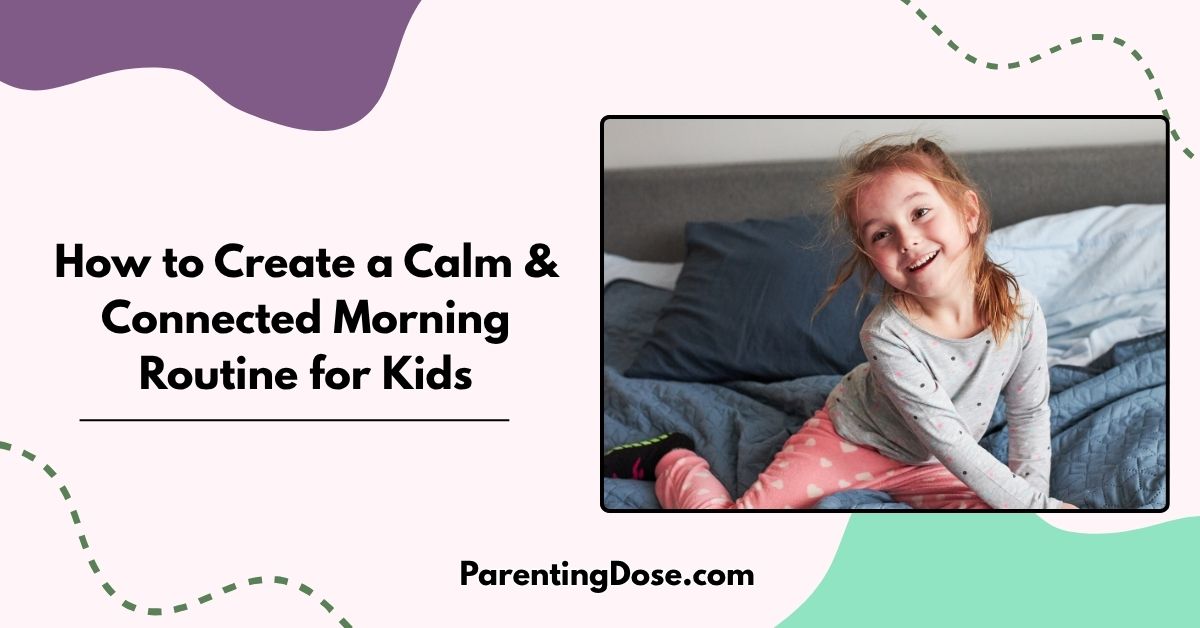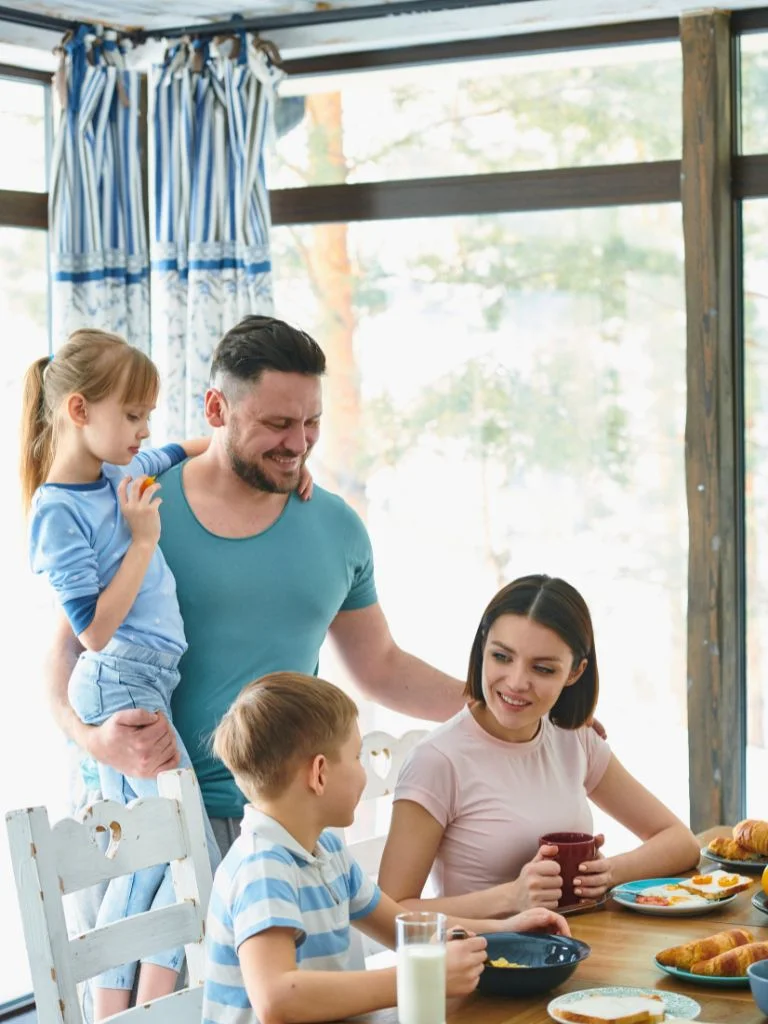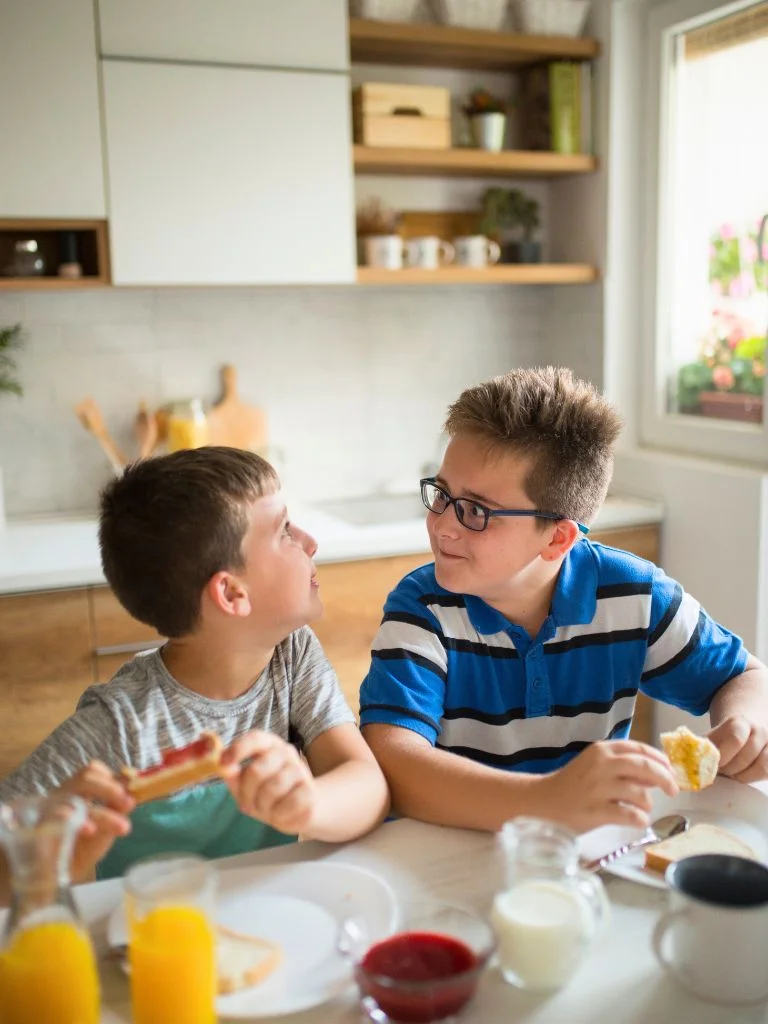Most “morning routine for kids” advice out there feels like it’s been copy-pasted from a parenting handbook. Brush teeth. Eat breakfast. Get dressed. Like… duh. We’re moms, not clueless. What we really want isn’t another checklist — it’s a fresh lens on why mornings matter and how they shape our kids on a deeper level.
So let’s scrap the paint-by-numbers routine and go deeper — into emotional tone-setting, micro-moments of connection, and what mornings can actually mean for your family’s emotional health.
Why the Energy of Your Morning Matters More Than the Steps
Ever noticed how your kid can eat the same breakfast on two different days — and one day they leave the house dancing, the next they leave in tears?
Same food. Same outfit. Different energy.
That’s because what happens in between the tasks (not the tasks themselves) is what shapes your child’s day.
- Did they feel rushed or respected?
- Were they yelled at or laughed with?
- Were their needs steamrolled or heard?
This emotional undercurrent becomes their emotional script — not just for the morning, but for how they handle transitions, stress, and relationships in the long run.
How to Add Fun + Connection to Your Kid’s Morning Routine:
Here’s a table I crafted which will definitely bring fun to your boring morning routine:
| Routine Step | Fun + Engaging Twist | Why It Works |
|---|---|---|
| ✅ Wake Up Time | Sunrise Dance Party — Put on a 2-minute happy song and do silly stretches or a pajama dance while the room lights up. | Music and movement stimulate dopamine, making wake-up feel joyful, not jarring. Adds energy without chaos. |
| ✅ Bathroom + Teeth | Brush Like a Monster — Use a 2-minute timer with silly sound effects. Encourage your child to growl while brushing or chase “sugar bugs.” | Turning mundane tasks into play builds intrinsic motivation. It also builds habits faster when kids associate them with imagination. |
| ✅ Get Dressed | Mini Fashion Show — Let them “model” their outfit in front of the mirror or let a sibling vote: “10/10 drip!” | Adds autonomy + positive attention. Creates buy-in so you’re not battling over socks. |
| ✅ Breakfast Time | Breakfast Builders — Let kids “build” their own plate: a yogurt parfait station, toast toppings, fruit faces. One thing they make, even if it’s just choosing toppings. | Fosters independence and creativity. Even picky eaters engage more when they feel involved in making their own food. |
| ✅ Morning Chores / Backpack Check | Secret Agent Missions — Write their chore on a sticky note like a spy assignment: “Agent Ava: Operation Feed the Cat” | Makes responsibility feel cool, not a drag. Kids love playing roles — it taps into storytelling and pride. |
| ✅ Out the Door | Goodbye Ritual — A personalized high five, a silly chant, or whispering “Superpower Activated!” while tapping their heart. | Rituals = emotional security. A consistent, loving send-off helps them transition with confidence and calm. |
Rewriting the Morning Routine: Through a Connection-First Lens
Let’s reframe “routine” to mean rituals of connection — moments that anchor your child in love and safety before they step into a loud, chaotic, overstimulating world.
Here’s a totally different morning routine framework — one that prioritizes emotional regulation, independence, and connection over perfection or performance.
1. Set the Emotional Atmosphere Before the Tasks Begin
Instead of starting with a checklist, start with energy calibration.
What does that look like?
- Dim lights gradually if possible.
- Soft music (our favorite: acoustic covers or nature sounds).
- A 10-second cuddle before even mentioning the to-do list.
Kids’ nervous systems are highly sensitive in the mornings. This is your chance to either charge their internal batteries — or start the day draining them.
2 . One Thoughtful Question Over Breakfast
Skip the “hurry up and eat” and try this:
“What’s one thing you’re looking forward to today?”
or
“What’s one thing that feels a little hard today?”
Let it be casual, like a thought tossed across the table with their toast.
You’re not just feeding their stomach — you’re feeding their sense of safety. This small emotional check-in teaches them it’s safe to name their feelings before the world demands performance.
3. Let Them Play a Role in the Routine
Instead of handing them a schedule, give them a role. Not a “task,” but a storyline.
- “You’re the Time Keeper today. Think you can keep us on track before 8:00?”
- “You’re the Shoe Patrol — make sure everyone’s feet are properly dressed!”
Kids crave autonomy and purpose. Turning the routine into a roleplay taps into their creativity and sense of power, making them more intrinsically motivated to participate.
4. Build In 5-Minute Margins
Every mom needs a buffer. You know, the five-minute margin when your kid suddenly needs to find their rock collection from last summer or remember the permission slip you never saw.
Instead of structuring a minute-to-minute schedule, bake in buffer time. Call it “pause time” or “slow stretch.”
Use it to:
- Sit together and watch the sky.
- Play a quick round of “Would You Rather.”
- Do nothing at all.
This builds emotional resilience. You’re modeling that even in full schedules, there’s room to breathe. That’s a skill they’ll carry for life.
5. Create a Personalized Goodbye Ritual
This one is powerful.
A secret handshake. A three-word mantra. A silly dance. A hug + whisper:
“You’ve got this. I’m proud of you. See you soon.”
It doesn’t have to be deep or Pinterest-worthy — it just has to be yours.
Why it works: Ritual = regulation. A predictable, loving goodbye ritual helps kids separate from you with a sense of security, not anxiety.
The Real Psychology Behind a Good Morning for Kids
A connected, calm morning routine helps your child:
- Regulate their nervous system (less fight/flight mode during school)
- Trust in their daily environment (reduces school drop-off anxiety)
- Build emotional fluency (they’re learning to name and navigate feelings)
- Feel competent (they leave the house knowing they can do things)
- Strengthen attachment (the emotional bond that affects everything)
This isn’t just about being organized. It’s about giving your child the tools to face the world with confidence, security, and joy.
And You, Mama? You Deserve a Morning That Feeds You Too
Here’s something no one says enough: Your energy leads the room.
If you’re burnt out, running on cortisol, yelling through gritted teeth… your kid picks that up and mirrors it.
That’s not guilt — that’s power.
So just like you’re curating the emotional tone for your kids, build one for yourself:
- A mug you actually love (not the chipped one you hate but keep using).
- A 60-second breath on the porch before waking everyone.
- A “no phone before teeth” rule — just for you.
Your routine matters because you matter.
Conclusion:
Whether your morning includes a dance party in the kitchen, a spy mission to feed the cat, or just a quiet hug in the hallway, those moments are shaping more than just your child’s routine — they’re shaping their self-worth, resilience, and trust in the world.
And mama, you don’t have to do it all. You just have to show up, with a little heart and a little humor. That’s more than enough. 💛





